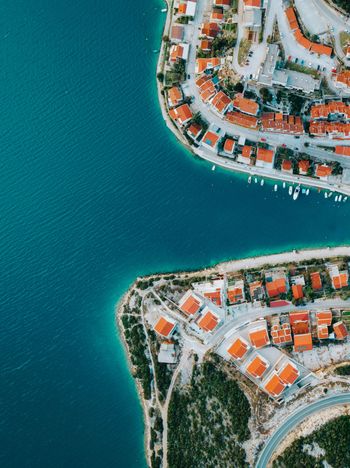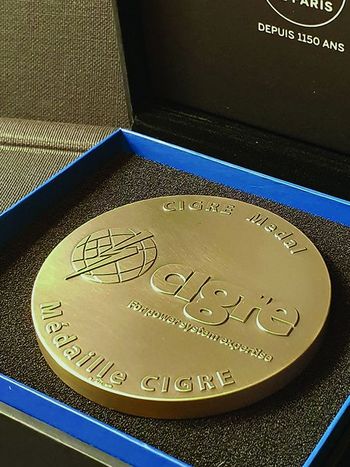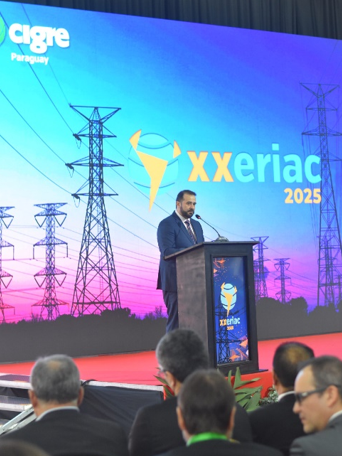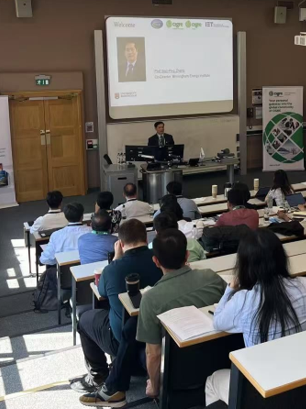CIGRE Montenegro IX Session: Innovation, Integration, and Regional Cooperation in Focus
The IX Session of the Montenegrin National Committee of CIGRE (CIGRE NC Montenegro) was held from 23 to 26 September 2025 at the Hotel “Mediteran” in Budva, gathering more than 260 participants, including experts, researchers, and representatives from the power industry across Montenegro and the wider region. The event featured 64 technical papers, two high-level panel discussions, and seven professional-business presentations, reaffirming the strong role of CIGRE Montenegro as a bridge between science, engineering practice, and policy.
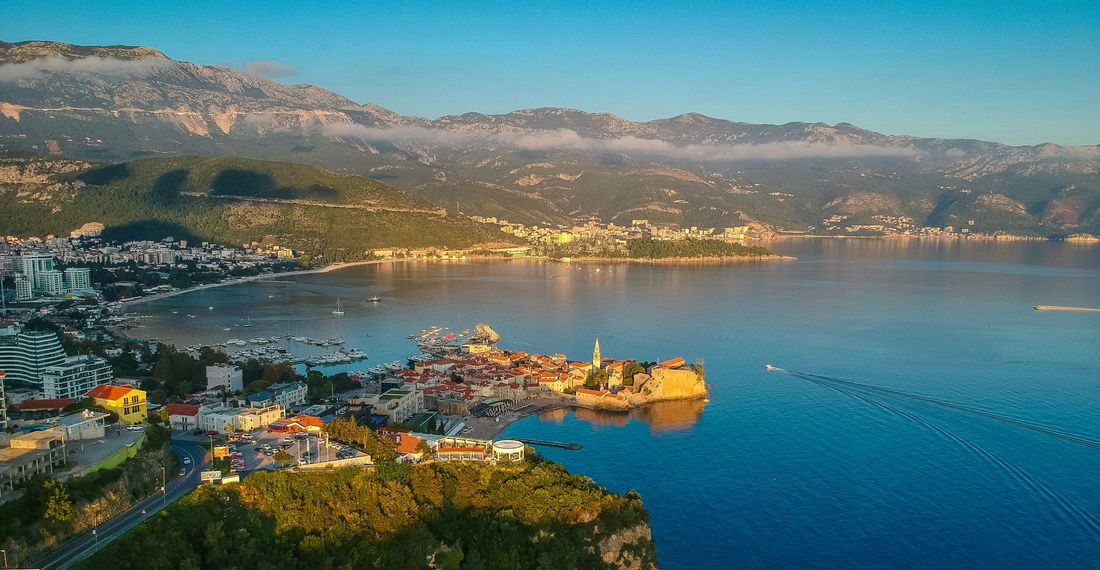
Budva - Montenegro
23-26 September 2025
Opening and distinguished guests
The opening ceremony was attended by key figures from Montenegro’s energy and academic sectors, including Mr. Admir Šahmanović, Minister of Energy and Mining, Prof. Dr. Budimir Lutovac, Dean of the Faculty of Electrical Engineering, Mr. Milutin Đukanović, President of the EPCG Board of Directors, Mr. Ivan Bulatović, CEO of EPCG, Mr. Aleksandar Mijušković, President of the CGES Board of Directors, and Mr. Ivan Asanović, CEO of CGES, as well as representatives of the Regulatory Agency for Energy, the Chamber of Engineers, and other institutions.

President CIGRE and Minister of Energy and Mining of Montenegro
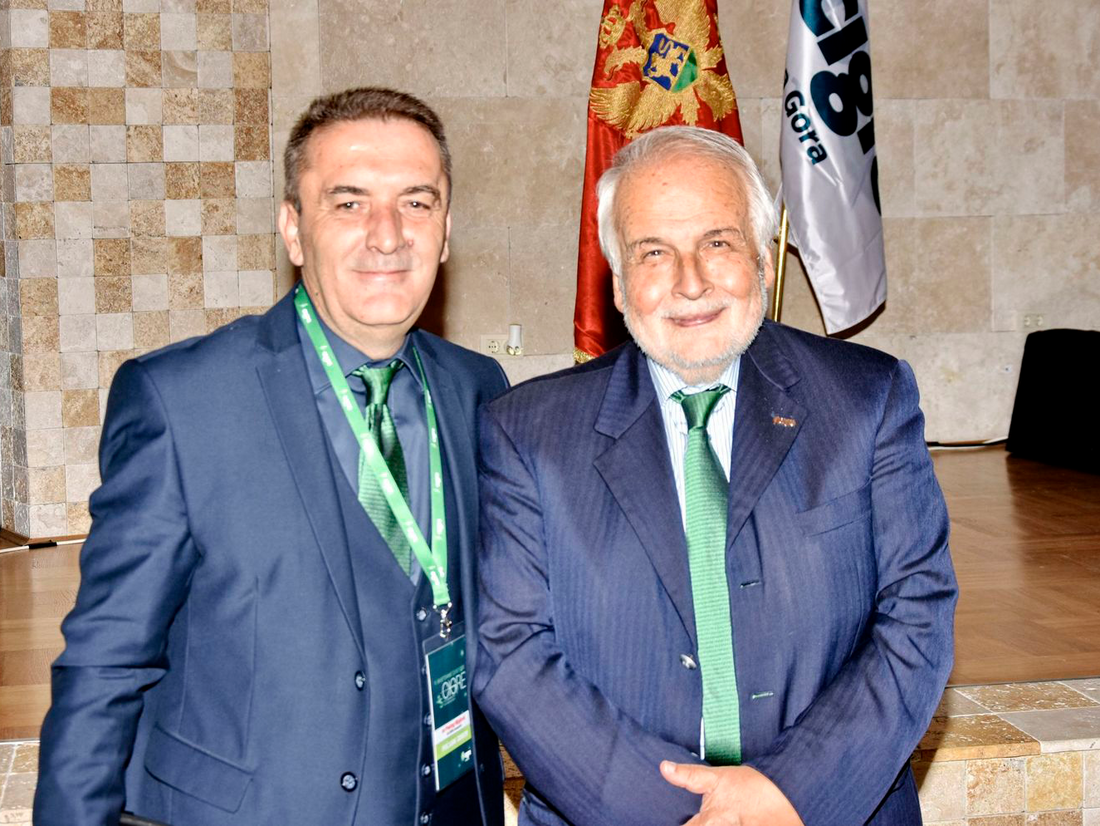
President CIGRE and President CIGRE NC Montenegro
A special honor for CIGRE Montenegro was the presence of Dr. Konstantin Papailiou, President of CIGRE Paris, who attended the opening ceremony and officially declared the Session open. His visit, as part of his ongoing engagement with CIGRE National Committees, reflected appreciation for the activities and commitment of the Montenegrin Committee within the wider CIGRE network. In his address, Dr. Papailiou commended the professionalism and enthusiasm of Montenegrin experts, emphasizing the importance of regional collaboration and the active involvement of young engineers in the global energy transition.
The event also brought together the Presidents of CIGRE Serbia, CIGRE Bosnia and Herzegovina, and HRO CIGRE Croatia, reaffirming strong regional cooperation within the SEERC framework and the shared vision of building resilient and interconnected power systems.
In his welcoming address, Mr. Predrag Mijajlović, President of CIGRE NC Montenegro, emphasized the importance of CIGRE as a living community of experts and friends exchanging knowledge and experiences to build the energy future of the region.
Minister Admir Šahmanović highlighted that the energy sector is “one of the few fields capable of driving both economic recovery and the green transition,” presenting national milestones such as the adoption of the Energy Law and Law on Renewable Energy Sources, the National Energy and Climate Plan, and the launch of renewable energy auctions.
Mr. Milutin Đukanović (EPCG) underlined the need for decisive investments in new generation and battery systems, noting that EPCG plans to develop over 650 MW of capacity by 2027, while Mr. Aleksandar Mijušković (CGES) stressed that “without CGES there can be no green transition,” referring to strategic projects like the 400 kV Lastva–Pljevlja line.
In his keynote, Dr. Konstantin Papailiou praised Montenegro’s commitment to knowledge exchange, reminding young engineers that: “The energy transition is not only a profession, it is a mission, because there is no Plan B, and no Planet B.”
The ceremony also honored Prof. Dr. Milutin Ostojić, recipient of the Nikola Tesla Award from SEERC, and Mr. Ranko Radulović, laureate of the Lifetime Achievement Award. Both speeches reminded the audience of the legacy of mentorship, professionalism, and passion that built Montenegro’s power sector.
Technical Papers and Sessions
The technical program of the IX Session of CIGRE NC Montenegro included 64 papers presented across 15 Study Committees, covering a wide range of contemporary challenges in power systems. The diversity of topics confirmed the importance of the Session as a regional meeting point for engineers, researchers, and energy professionals.
Presentations spanned traditional areas such as rotating machines (SC A1), transformers (SC A2), overhead lines (SC B2), and substations (SC B3), as well as current issues including HVDC technology, power electronics, system protection, and renewable integration. Research teams from Montenegro and neighbouring countries shared practical experience and analyses of real grid situations, from transformer diagnostics and high-temperature conductors, to voltage stability and balancing under growing shares of solar and wind generation.
Special focus was placed on distributed generation and energy storage, as well as the adoption of smart substations, monitoring systems, and cybersecurity standards in line with IEC 62443 (SC D2). Contributions from universities, particularly the Faculty of Electrical Engineering in Podgorica, highlighted the growing participation of young experts in applied research and regional cooperation.
A recurring theme across sessions was the alignment of national practices with ENTSO-E and EU standards, as Montenegro and neighbouring countries prepare for deeper market integration and cross-border balancing cooperation.
Overall, the technical sessions demonstrated CIGRE Montenegro’s continued role as a platform connecting practical experience with new technologies and European trends in system operation and modernization.
Panel discussions
Two thematic panels gathered experts from Montenegro and Europe and addressed some of the most urgent strategic and technological questions facing the regional power sector.
The first panel, “Transformation of Power Systems through Power Electronics,” moderated by Prof. Dr. Vladan Vujičić (University of Montenegro), brought together Prof. Dr. Petar Grbović (University of Innsbruck), Dr. Ervin Spahić (WindGrid, Elia Group) and Dr. Marija Vujačić (Hitachi Energy). The discussion underlined that advanced power electronics (including smart converters, inverters and battery systems) is no longer an emerging topic but a critical enabler of flexibility, stability and resilience for future grids. The speakers emphasized that early and well-integrated deployment of such technologies is essential for a secure energy transition.
The second panel, “Modern Challenges in Power System Operation: Ensuring Stability, Flexibility and Resilience,” moderated by Mr. Ranko Redžić (CGES), featured Mr. Miloš Đurđević (SCC Belgrade), Mr. Elio Voshtina (OST Albania), Mr. Bojan Rebić (NOS BiH) and Mr. Slobodan Marković (EKC Belgrade). This panel focused on operational security, regional coordination and real-time decision-making. Speakers pointed to the need for harmonised regulation, strengthened interconnections and continuous investment in transmission infrastructure as preconditions for reliable system operation in the face of rapid renewable integration.
Organization and support
The successful organization of the IX Session was made possible through the strong support of Montenegro’s power companies and international industry partners, led by Hitachi Energy, CGES, EPCG, Siemens, GE Vernova and others, whose contribution ensured both the professional and social quality of the event.
Conclusions
The IX Session of CIGRE NC Montenegro confirmed the continuity and commitment of Montenegro’s professional and academic community to addressing current energy challenges and following Europe’s ongoing transformation. The participation of the CIGRE President, representatives of national institutions, and key energy companies reflected constructive cooperation between industry, academia, and public authorities.
With broad attendance, high quality technical content, and valuable international exchange, the 2025 Session strengthened professional dialogue and knowledge sharing, contributing to a better understanding of the transition toward a secure and sustainable power system.



